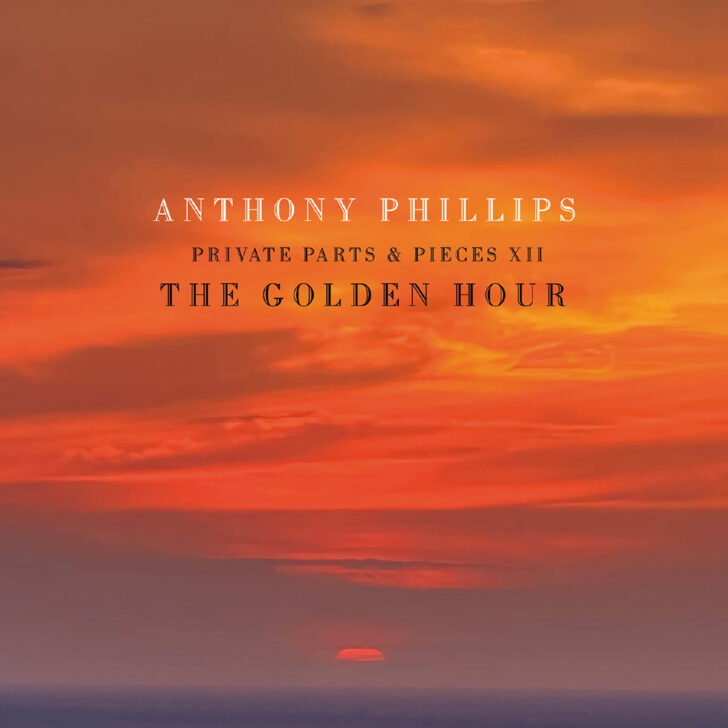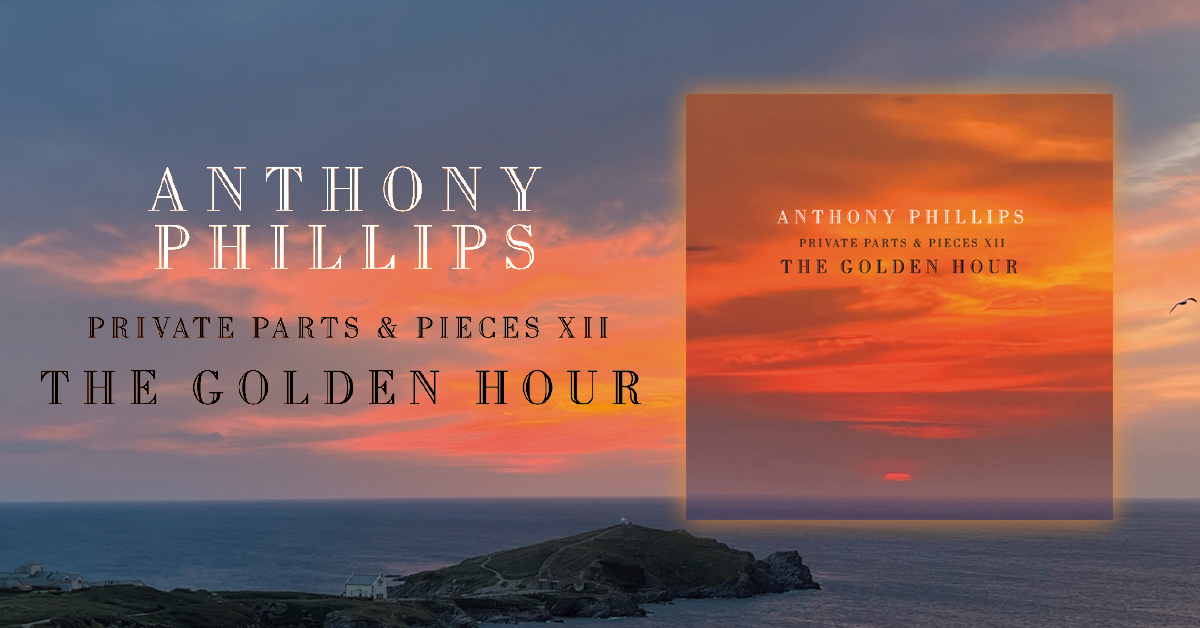- Article
- Read in 7 minutes
Anthony Phillips – Private Parts & Pieces XII: The Golden Hour – album review
In spring 2024, Anthony Phillips somewhat surprisingly announced a twelfth album in his Private Parts & Pieces series. Tom Morgenstern shares his thoughts about The Golden Hour.
The announcement of another album in the almost legendary Private Parts & Pieces series at the end of March came as a big surprise, as the last album in the series, City of Lights, had already been released in 2012. In the meantime, Anthony Phillips’ record company Esoteric Records had also thoroughly scrubbed through his archive. In addition to three Private Parts & Pieces box sets with all eleven albums to date and a bonus CD each with unreleased Extra Pieces, two 5CD box sets were also released with all of his two retrospective series Missing Links and most recently Archive Collections. The terrain could therefore have been considered to have been definitively grazed.
Anthony Phillips himself would never have thought that there would be another Private Parts & Pieces album. He had intended to follow up his last guitar album, Strings Of Light (2019), with a piano album, but ongoing problems with his wrist and shoulder have made regular music-making virtually impossible over the last two years, apart from a few quick sessions in between when he was feeling a little better. With the piano album not going ahead, his long-time archivist Jonathan Dann had fortunately contributed some older recordings that Anthony had long forgotten about – material mainly from the 80s and 90s. With the help of a seven-track demo compilation, Esoteric finally gave the green light for a new – and, as Phillips writes in his liner notes, “very traditional PP album of old, a collection of pieces of disparate background,” of which he hopes, “constituting a cohesive whole”.
To say it in advance: it has indeed succeeded. The versatile and varied album can be listened to in one go without any problems despite its one-hour running time, and there are no skip candidates among the 23 partially very short pieces.
It begins with the four-part Wychmore Hill Suite, presumably recorded in the 1980s – a beautifully composed work for two or more open-tuned acoustic 12- and 6-string guitars which, with some up-tempo passages and a strongly rhythmic structure, is reminiscent of earlier greats such as the two-part title track of his debut album The Geese & The Ghost, but is free of any pastoral impression. The first part of Country Mile really gets going, it’s just a shame that it fades out after just over 3 minutes.
The virtuosity of part 2, Ring of Steel, is reminiscent of Kolbe & Illenberger or Al di Meola / Paco de Lucia – simply wonderful.
Part 3 begins more quietly with chord sequences that could be described as typical Phillips. The subtitle Peaceful Land is apt, although here too the rhythmic emphasis gradually increases.
The highlight of the Wychmore Hill Suite, however, is the final part 4, Jack The Lad, a piece that creates several arcs of tension in succession with an incredible density of dynamics and energy, and is instantly pleasing to the ear with its virtuoso yet catchy melodic sequences. This is certainly one of the five best guitar pieces that Anthony Phillips has ever composed and recorded. Unbelievable, really, that such a great achievement should be forgotten and left to gather dust in the archives for decades.
With Twilight Of A Diva we switch to piano for the first time. A perfectly composed ballad with some sad maj7 chords and a slightly melancholic melody.
High Flight is a typical ambient track with long fading synth chords and lots of reverb – the first of two collaborations with James Collins, who also did the main editing on the album.
After this ethereal excursion, it’s back to earth with a slow duet of two classical guitars called Sarabande Noir, co-written and beautifully played by Anthony and his Argentinian friend Enrique ‘Quique’ Berro Garcia.

Kathryn Downes Trad. is indeed very traditional in structure, almost like an old folk song. If it had lyrics, you would certainly be able to sing along to the catchy, but by no means cheesy piano melody after just one listen. The clearly audible noise level here suggests that this is probably an older recording, and not a rerouted track from the piano album that has not yet been realised. Who the person in the title is will remain a mystery until the remastered reissue in a few decades’ time.
The following title track, The Golden Hour, a great duet of 12-string and nylon guitar solo, unfortunately only two and a half minutes long, is one of the pieces written in the last two years. It features a “bizarre” open tuning on his 12-string guitar, which, according to Phillips, makes it impossible to play with two hands on the piano because there would be a few notes missing in the middle.
Hour Glass is a short piano solo, with no chord changes and repetitive arpeggios that come very close to the ringing of bells. Beautifully done, well played and very atmospheric. Based on the impeccable sound quality, this must be a new track – a descendant of the piano album?
Roads in Between is the only song on the album. An instrumental version recorded in 1995 can already be found on the Extra Pieces CD from the third PP&P box set, where there is also a note that the song was already written in 1983 – so this could be the original version. It sounds like a demo of Invisible Men and suffers a bit from the very monotonous drum machine, but there’s no denying that it’s a good song with a strong chorus.
Benediction consists of a rapid series of strummed arpeggios on a nylon guitar, played exclusively from bottom to top, with the highest note at the end representing the melody, which is not unlike a chorale, hence the title.
Soliloquy For Sylvie is the other piece created with Quique. He plays the nylon solo while Phillips lays the synth strings underneath. It is possible that both pieces with Berro Garcia come from the same session in July 1994, four of which had already appeared on Dragonfly Dreams (Private Parts & Pieces IX) and Extra Pieces III.
Like Hour Glass, Rushlight is a kind of loop of guitar arpeggios, even more akin to the ringing of bells.
In New World, the following short synth piece co-written by James Collins, there are also no chord changes. This gives it an open, floating, flowing impression, which then quickly transitions into
Cirrus, an even shorter ambient piece with a piano played backwards in the background.
Under the Southern Stars is a beautiful piano solo with a classical song structure, played with virtuosity in the middle section. This recording also betrays its age through the noise level.
In Sea Drift, a short ambient piece, the 12-string guitars are used again in a kind of endless loop that quickly fades out. Again, the sound quality is less than ideal, and in places you can hear background noises that could be the remains of a conversation in the background (or a radio playing).
Night Spectre is another one-minute track with synth sounds played backwards over a continuous drone that builds slightly towards the end.
The rhythm machine is used again in Mean Streets. A piano plays a simple melody before the warm synth chords, which were in the background at the beginning, get louder and louder and finally take over everything.
Sky Diving follows without a break. With its synthetic female choirs and the Far Eastern sounding pentatonic synths in the foreground, it could have come from the “Slow Dance” era.
Summer’s Lease is another classical-sounding solo piano, this time in a leisurely three-four time.
His Final Bow closes the album. A short but atmospheric, melancholic swan song of fat synth chords, dedicated to the fictional running gag Sir Ralph Bernascone, “who has retired from a lifetime in music (modern), politics and armadillo training”, as Phillips reveals with a grin in the booklet.
After a strong start, the album seems to gradually fray, the pieces become shorter and shorter and often merge into one another. One ‘linking piece’ often follows the next. Nevertheless, something like a common thread seems recognisable from the very first listen. As if unintentionally, melodies seem to be picked up again, moods fit together and actually result in the big, never originally intended whole. Which is exactly what has always characterised good albums in the Private Parts & Pieces series. This is also due to the sound of the album, which despite the diversity of the material sounds very cohesive – probably thanks to Stephen W Tayler’s careful mastering, which at first seemed to lack a bit of treble, but which I now appreciate for its warmth.
The only disappointment is the lack of information in the slim booklet about the background to the creation of each track. When asked about this, Anthony Phillips said that, as with many of the first releases in the Private Parts & Pieces series, he deliberately gave only basic credits, simply because he really liked the mysterious quality of the pieces.
Well – this reviewer would still not recommend waiting for a re-release, because then the listener would miss out on the immediate enjoyment of this outstanding album.
Author: Tom Morgenstern
Private Parts & Pieces XII: The Golden Hour will by released by Cherry Red on 31 May and can be ordered from their webstore or Burningshed.

